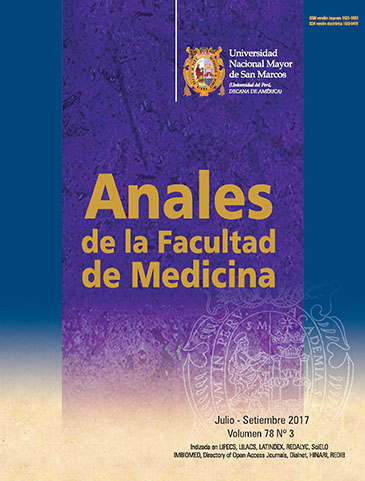Knowledge of health in Peru - 17th century
DOI:
https://doi.org/10.15381/anales.v78i3.13770Keywords:
Higher Education, Educational Policies, Scientific and Health Development.Abstract
During the Viceroyalty of Peru, hospitals and universities were developed by Christian charity. Rote learning process, ecclesiastical hegemony, and poor organization frustrated innovative ideas about sciences by absence of a civilian elite capable of formulating higher education policies. The arrival of the Royal Philanthropic Expedition of the Vaccine, in 1806, spread the knowledge and the basis of sanitary organization. The Departmental Vaccination Boards were established, whose management occurred within contradictions in the first public policies of sanitary control. This situation remained until the Anatomical Amphitheater was founded.Downloads
Published
2017-11-30
Issue
Section
Historia y Humanidades en Salud
License
Copyright (c) 2017 Esteban Eduardo Zarate Cárdenas, Rosario Jiménez

This work is licensed under a Creative Commons Attribution-NonCommercial-ShareAlike 4.0 International License.
Those authors who have publications with this magazine accept the following terms:
- Authors will retain their copyrights and guarantee the journal the right of first publication of their work, which will be simultaneously subject to Creative Commons Attribution License that allows third parties to share the work as long as its author and its first publication this magazine are indicated.
- Authors may adopt other non-exclusive licensing agreements for the distribution of the version of the published work (eg, deposit it in an institutional electronic file or publish it in a monographic volume) provided that the initial publication in this magazine is indicated.
- Authors are allowed and recommended to disseminate their work over the Internet (eg: in institutional telematic archives or on their website) before and during the submission process, which It can produce interesting exchanges and increase quotes from the published work. (See El efecto del acceso abierto ).
How to Cite
1.
Zarate-Cárdenas EE, Jiménez-Alva MDR. Knowledge of health in Peru - 17th century. An Fac med [Internet]. 2017 Nov. 30 [cited 2024 Jul. 17];78(3):343-50. Available from: https://revistasinvestigacion.unmsm.edu.pe/index.php/anales/article/view/13770















